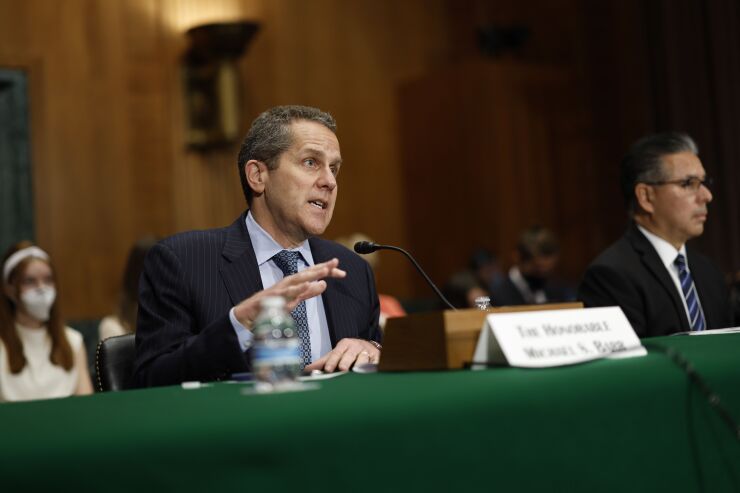WASHINGTON — The Federal Reserve's vice chair for supervision laid out an expansive vision for his approach to financial regulation in the Biden era on Wednesday, suggesting that the central bank would pursue significant reforms of banks' capital rules, climate-risk assessments and bank-merger reviews.
In his first public remarks since being sworn in in July, Michael Barr told a Brookings Institution audience that he would seek to make the U.S. financial system "safer and fairer, in support of an economy that serves the needs of households and businesses."
Regulators must be vigilant and maintain "an active and never-ending effort" to police the financial system, Barr said in prepared remarks.
"Success in financial regulation and supervision does not mean standing still," Barr said, "because finance does not stand still. The regulatory and supervisory framework adopted after the crisis recognizes that innovation and change are constant in finance, that our understanding of existing and emerging risks can and should deepen over time, and that regulation and supervision must evolve to be effective."

Barr's speech echoed a key remark made during his Senate Banking Committee confirmation hearing, when the former University of Michigan academic and Treasury Department official in the Obama administration said he intended to reevaluate banks' capital requirements "
While Barr spoke in broad strokes on Wednesday, he said he would have "more to say" on capital requirements "later this fall."
Barr stressed that a core principle of capital regulations was that they must be "forward-looking and responsive to changes in macroeconomic conditions, market structure and financial activities" while continuing to be risk-adjusted.
"Different activities pose different potential for loss, and the capital regime should calibrate requirements to account for the risks of specific activities," Barr said. "This means that firms face higher costs through more stringent regulations as they grow in complexity, size and interconnectedness — and, rightly, that community banks face simpler regulations."
In a move that may provide the banking industry a bit of heartburn, the vice chair for supervision also took aim at bank-merger-review policy. Progressives have argued for years that the current merger regulations fail to take into account
Barr's remarks appeared to be sympathetic to some of those concerns on Wednesday.
"A merged institution may be able to provide more competitive products and services, but it could also have the potential to reduce competition and access to financial services in a geographic area by raising prices, narrowing the range of services offered, and reducing the supply of small-business or community-development loans that rely on local knowledge," Barr said in his prepared remarks.
The new vice chair for supervision selected a career Federal Reserve staffer to oversee the implementation of his supervisory and regulatory policies. Progressives had been urging him to pick an outsider for the position.
On climate change, Barr said that the U.S. central bank was still "working to understand how climate change may pose risks to individual banks and to the financial system." But he said that the Fed will take further strides towards instituting more formal "scenario analysis" tests to evaluate banks' climate-risk preparedness. The Fed will also work with the Federal Deposit Insurance Corp. and Office of the Comptroller of the Currency in the coming months to develop climate guidance for the nation's largest financial institutions, Barr said.
Barr also shared that the Fed planned to launch "a pilot microprudential scenario analysis exercise to better assess the long-term, climate-related financial risks facing the largest institutions" next year.
The vice chair stressed the need for regulators to respond to the rise of stablecoins, a form of cryptocurrency that attempts to emulate the function of private money by maintaining a fixed value, usually for facilitating other crypto transactions. But while Barr said the sector could pose financial stability risks without proper regulations, he reiterated a call made by other Biden officials over the last year that Congress must play a role in the framework's creation.
"I believe Congress should work expeditiously to pass much-needed legislation to bring stablecoins, particularly those designed to serve as a means of payment, inside the prudential regulatory perimeter," Barr said in his prepared remarks.
On the broader crypto sector, Barr acknowledged that financial innovation could be "a positive force that can increase access and lower costs for individuals and businesses" — a sentiment that may put some in the fintech and crypto sectors at ease.
But Barr warned that amid rapid growth of new products and technologies, "excitement can outrun the proper assessment of risk."
"Banks engaged in crypto-related activities need to have appropriate measures in place to manage novel risks associated with those activities and to ensure compliance with all relevant laws, including those related to money laundering," Barr said.
In a Q&A session after his speech, Barr acknowledged some potential for "pain" in the economy as the Fed continues to raise rates in response to historically high inflation. His comment reiterated Fed Chair Jerome Powell's message in a speech last month in Jackson Hole, Wyoming.
"There's the basic fact that inflation in our country is just far too hot," Barr said. "I'm quite focused, and the Fed is quite focused, on making sure we do the steps necessary to bring inflation back down to its target. I'm committed to doing that."
Barr also suggested in the Q&A that he would support the revival for a key power once held by the Financial Stability Oversight Council that was essentially eliminated during the Trump administration — the ability for FSOC to designate nonbank financial institutions as "systemically important," making them subject to Fed supervision.
"I do think it's important to have a vigorous Financial Stability Oversight Council process, and to have a process that would permit the designation of nonbank firms if they could pose a risk to financial stability," Barr said.






